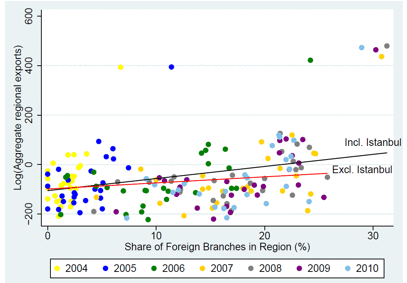Foreign banks can play an important role in facilitating international trade. They can provide trade financing, enforce contracts, and reduce information asymmetries. Studies have shown that trade financing is an important channel to boost exports. For example, Claessens and others (2015) show that sectors that are more dependent on external finance have more bilateral exports when a foreign bank from that trade partner is present in the country. Much like immigrant networks and colonial ties (Rauch 1999), foreign banks can play a role in reducing information asymmetries for exporting firms, especially in countries where there are fewer financing constraints. Foreign banks have strong ties with their parent country, and are better placed to assess the profitability of a given product in that market and provide information about export market conditions.
In a new working paper (de Nicola and Tan, 2017), we examine the effects that foreign banks have on exports of the 26 sub-regions in Turkey in 2002–10. The focus on a single economy allows for better control of countrywide elements and, more importantly, Turkey presents a distinct case for examining the information role of foreign banks, as Turkish firms are less reliant on banks for financing. Over 70 percent of firms use their own capital or retained earnings to finance production activities, and Turkish exporters are financed by cash on delivery. In our analysis, we explore whether the presence of foreign banks (the extensive margin) and the footprint of the banks (the intensive margin) from the trade partner affect bilateral exports after controlling for the financial development of the sub-region.
Preliminary analysis suggests that foreign banks in a sub-region play an important role in export promotion. Figure 1 presents a positive correlation between aggregate exports and the local share of foreign bank branches in the sub-regions for 2004–10. The positive correlation holds even after excluding Istanbul, where most foreign banks are located.

We find that the footprint of foreign banks from the same country as the trade partner has the largest effect on increasing the bilateral exports of the sub-regions. We first compare the effects of each variable on exports in separate regressions: a one standard deviation increase in the presence of foreign banks increases the log of bilateral exports by 0.02 standard deviation, and a one standard deviation increase in the shares of foreign banks in the sub-region increases the log of bilateral exports by 0.08 standard deviation. When we examine all the variables — the presence and footprint of the foreign banks and the financial development of the sub-region — in one regression, we find that the footprint of the foreign bank is the most important for the sub-region’s exports.
We also document some spillover effects of foreign banks from countries that are neighboring the trade partner, or regional countries. We find that the presence of foreign banks from regional trade-partner countries can increase bilateral exports to that trade partner. But as the footprint of these banks from regional countries increases, bilateral exports to the trade partner decrease. This suggests that foreign banks of regional countries can create a trade diversion effect. The negative effects of foreign banks from regional countries on exports are mitigated by the positive effects of bank branches from the trade partner.
Our results show that in addition to financing, banks can play an important role in providing information and reducing information asymmetries for exporters. Future research should try to identify the mechanisms by which banks transmit information to exporters, and whether the information from banks is unique and cannot be replicated by other agencies, such as export promotion boards and chambers of commerce.
References
Claessens, Stijn, Omar Hassib, and Neeltje van Horen. 2015. “The Role of Foreign Banks in Trade." Discussion paper, World Bank, Washington, DC.
De Nicola, Francesca, and Shawn W. Tan. 2017. “Foreign Banks and Trade: Bridging the Information Gap?” Policy Research Working Paper 7967, World Bank, Washington, DC.
Rauch, James E. 1999. "Networks Versus Markets in International Trade." Journal of International Economics 48 (1): 7–35.


Join the Conversation